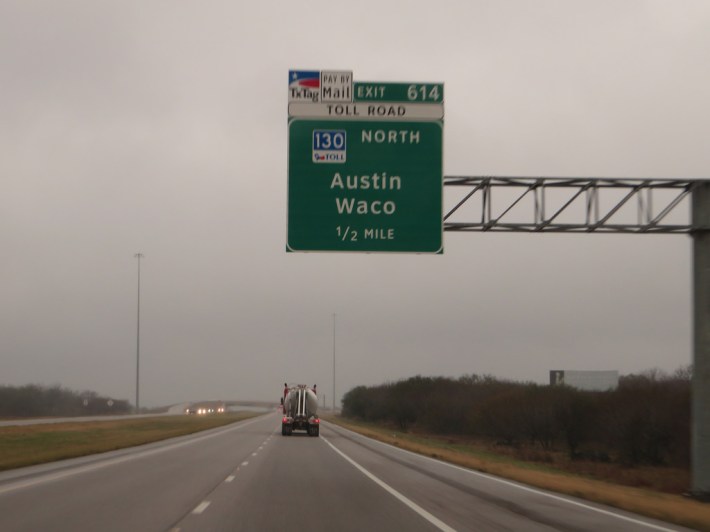From the beginning, there were plenty of reasons to suspect that Texas 130 -- a private toll road between San Antonio and Austin -- was a bad idea.

For one thing, the state of Texas looked into extending the highway in 2006 and concluded it wouldn't generate nearly enough toll revenue to pay for construction.
Nevertheless, when two private firms, Cintra and Zachry Corp., decided to take the project on in 2008, the state of Texas and federal officials were happy to help. Cintra and Zachry put together a deal to build the $1.35 billion freeway. They lined up $430 million in federally-backed TIFIA loans, and promised to share toll revenues with the state of Texas and pay $25 million upfront.
Today, four years after the road opened, it is bankrupt. Katherine Blunt at the San Antonio Express-News has done some Pulitzer-worthy reporting about Texas 130 and the questions raised by similar toll road projects. Here are a few of the highlights of her report:
- At the time the road went bankrupt, traffic volume was just 30 percent of what consulting firm AECOM predicted. But AECOM -- which has been sued for fraud in similar cases -- and its subsidiary Maunsell have refused to disclose detailed traffic projections, saying they are proprietary. Both the Texas Attorney General and U.S. DOT have backed the company, allowing AECOM to withhold its justification for the project from the Express-News.
- Cintra and Zachry put up $197 million -- about 14 percent of the cost. But that stake was packaged and sold to investors (in the case of the Zachary Corp., to three investment funds overseen by a Australian firm). Since some construction contracts went to Ferrovial, Cintra's parent company, the firm may have managed to make money even though the road did not.
- The highway appears to have exacerbated flooding problems for the community of Lockhart. One resident told the Express-News that she now has to tie her propane tank to a tree to keep it from floating away when it rains.
- Construction quality was not good. Just two years after the road was complete, an inspection found 160 pavement defects, though some of those have since been repaired.
Texas 130 is the third private toll road that received TIFIA funding to have declared bankruptcy or be restructured.
In another case, the "Pocahontas Parkway" in Virginia, the toll road received a $150 million TIFIA loan. The full balance of the federal loan was transferred to the new owner, DBi Services, in May 2014, after original owner Transurban surrendered the road in a "defacto bankruptcy" in 2013.
In San Diego, the South Bay Expressway borrowed $172 million backed by TIFIA, the Express-News reports. The balance of that loan was written down in bankruptcy to $93 million. In return, the federal government was given a 32 ownership stake.
As for Texas 130, it remains to be seen how much of the $430 million in TIFIA funds will be recovered. When pressed by the Express-News, U.S. DOT refused to comment.
Given the checkered track record of private toll roads, it might be worth considering a simple fix: Better independent vetting of traffic projections. Firms hired to produce traffic projections have a history of inflating the numbers. They have a financial incentive to do so, because it often leads to future business.
Robert Bain, an expert on toll road finance and traffic projection voodoo, has recommended "independent peer reviews" of traffic forecasts for private roads [PDF]. The TIFIA program could minimize losses by subjecting deals to more independent scrutiny before making an investment.





